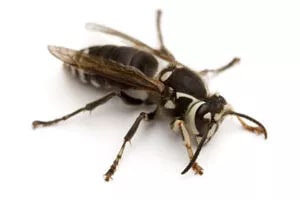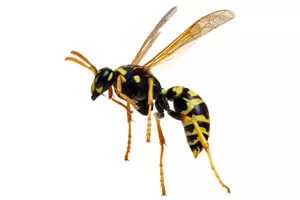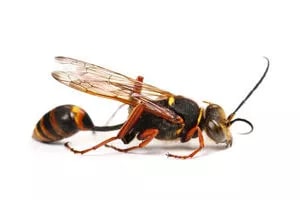Most people can differentiate between a wasp and a bee but can you tell the difference between a yellowjacket and another wasp? Before contacting your local pest control company to remove these insects, continue reading to learn how to identify them.
What Are Wasps?
Wasps are a group of insects in the Hymenoptera order that aren’t ants, bees, or sawflies. They have smooth bodies and no hair.
Types of Wasps
There are over 30,000 wasp species in the world, but only a few you may encounter here in the Pacific Northwest. Those include yellowjackets, bald-faced hornets, paper wasps, and mud daubers.
We’ll further explain each wasp species and its habits below.
Yellowjackets
Yellowjackets are the smallest of social wasps. They are typically black with yellow stripes and feed on other insects and even human food. In fact, they’re diet changes with the season. In spring, they are attracted to protein whereas in late summer, they’re attracted to sweets. They generally build their nests in eaves, in holes, in trees, and underground. They are especially aggressive in late summer and early fall when food becomes scarce.
Bald-Faced Hornets
Bald-faced hornets are black with white faces and are around ¾” in length. They will build nests in shrubs, trees, and sometimes buildings. Bald-faced hornets typically feed on nectar and fruit juices and are very aggressive. They will not hesitate to sting anything that comes near them. People who’ve been stung by bald-faced hornets have described their allergic reactions similar to that of other hornet stings.
Paper Wasps
At a glance paper wasps appear black, but they’re mostly brown with large red or yellow patches. They have two body sections and are the most docile of the three main social wasp species. They are generally beneficial, helping control fruit-destroying insects. And they tend to only become aggressive when their nest becomes provoked.
Mud Daubers
Mud daubers are generally black and yellow with two body sections and long, string-like waists. They’re non-aggressive and solitary. They don’t live in colonies. Like paper wasps, mud daubers are also considered beneficial insects in that they pollinate flowers and prey on other pests.
Experts in Wasp Control
We hope you have a better understanding of wasps. If you have wasps on your property, contact your local pest control company like United Pest Solutions for expert advice. We serve the greater Bellevue metropolitan area.



